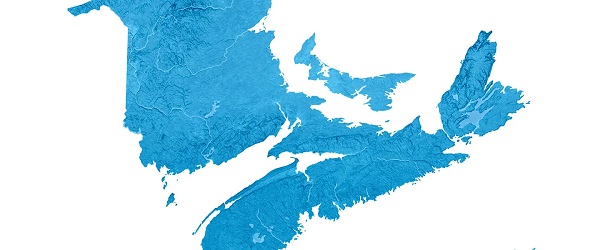Alberta
Maritime provinces can enact policies to reduce reliance on Ottawa / Alberta

From the Fraser Institute
By Alex Whalen
Nova Scotia’s Finance Minister John Lohr recently took the rare step of publicly commenting on the province’s reliance on transfer payments from Ottawa. For decades, the Maritime provinces have heavily relied on federal transfers, and the equalization program in particular, to fund provincial budgets.
Ottawa collects taxes from across Canada and then redistributes money to different provinces and/or individual Canadians through various programs, including equalization. The MacDonald Notebook recently reported that Lohr told a Halifax Chamber of Commerce audience “we’re very aware that we are very dependent on transfer payments from other parts of the country… we can’t continue to take that for granted… we have the resources here.”
Lohr makes an important point. Consider equalization, a federal program that, in effect, provides payments to provinces with weaker economies and a lower ability to raise tax revenues, with the goal of ensuring all provinces can deliver comparable services at comparable tax rates.
Premiers in other provinces have often lobbied for changes including reform or outright elimination of the program. In fact, Newfoundland and Labrador (backed by Alberta, British Columbia and Saskatchewan) is currently challenging the program in court. These provinces believe the program is unfair given how equalization payments are calculated on an annual basis. And this is a serious political concern because at some point these provinces could force reforms to equalization that would result in reduced payments to recipient provinces.
Such a move would have a major impact on provincial finances in the Maritimes. In 2024/25, Prince Edward Island, New Brunswick and Nova Scotia are the three provinces most dependent on equalization funds, ranging between $3,718 per person in P.E.I. to $3,252 per person in Nova Scotia. Equalization represents between 19.4 per cent and 21.9 per cent of provincial revenue in these provinces. Put differently, without this federal transfer program, these provinces would lose roughly one-fifth of their revenue. Only Manitoba comes close to this level of reliance on equalization.
But why should the Maritime provinces wait to have reform forced upon them? Moreover, it shouldn’t be a goal to be a long-term recipient province for the same reason one wouldn’t want to be a long-term welfare recipient. Regardless of what Alberta and Saskatchewan wants, we in the east should want to be off equalization for our own reasons. Strengthening provincial economies in the Maritimes would raise living standards and incomes, while strengthening provincial finances and reducing reliance on programs such as equalization.
So, what can be done?
First, the Nova Scotia government’s recent shift in policy to permit more natural resource development in areas such as mining and natural gas is a strong first step. The province is sitting on billions of dollars in economic opportunity in this sector, while the sector’s wages tend to be among the highest of any industry. Other provinces should follow suit and develop their natural resource sectors.
More broadly, governments in the region should trim their bloated bureaucracies to make way for broad-based tax relief. The Maritime provinces have the largest governments in Canada, with government spending (at all levels—federal, provincial and local) exceeding 57 per cent of provincial economies. A consequence of this large government sector is some of the highest taxes in North America (across all types of taxation). Reducing the size of government to national-average levels would make room for substantial tax relief that would boost growth in the region.
Long-term dependence on federal transfers does not need to be a given in the Maritimes. With the right policy environment in place, the governments of Nova Scotia, P.E.I. and New Brunswick can strengthen their economies while reducing reliance on the rest of Canada. On this front, Minister Lohr is on the right track.
Alex Whalen
Director, Atlantic Canada Prosperity, Fraser Institute
Alberta
Albertans choose new licence plate design with the “Strong and Free” motto

First new plate in 40 years hit the road in 2026.
Albertans have chosen beautiful Moraine Lake in Banff National Park as the new design for the province’s licence plate.
After three rounds of voting and more than 240,000 votes cast, Albertans have spoken. The iconic Moraine Lake in Banff National Park will be featured on the province’s new licence plate.
Available in mid-2026, echoing the “Strong and Free” motto of our province, the plate reflects Alberta’s bold identity, economic strength and deep-rooted provincial pride. The motto’s inclusion on the licence plates will also serve as a nod to Canada’s national anthem and Alberta’s position as a strong and sovereign province within a united Canada.
“Albertans know who we are and what we stand for: we are strong, free, resilient and united by the natural beauty that defines our home. Moraine Lake is recognized around the world, and the fact that Albertans chose it makes this new plate deeply meaningful. Thank you to the Albertans who cast more than 240,000 votes and helped choose a design that showcases Alberta’s natural beauty and will stand as a proud symbol of our province for years to come.”
Moraine Lake is one of Alberta’s most iconic destinations, making it fitting that it be on the province’s licence plates for motorists around the country to see. The licence plate depicts the breathtaking panoramic view of Moraine Lake that perfectly displays the province’s beautiful Rocky Mountains, which attract visitors from around the world to Alberta.
“Having the iconic Moraine Lake on our licence plates is something we can all be proud to show off. Thank you to every Albertan who cast their vote in our tournament. Because of you, the beauty and strong and free spirit of our province will be on display for motorists across the country.”
If an Albertan wants to replace their current plate for the new licence plate once it is released, they can voluntarily pay a $28 fee. Alternatively, Albertans could obtain a new plate on their vehicle registration renewal date at no additional cost. Motorists may also continue using the previous licence plate once the new licence plate is brought onboard, provided it is still in good condition.
Quick facts
- Alberta’s current licence plate was designed in 1984.
- In 2021, Alberta began a transition from painted to reflective plates with the same design.
- The new design incorporates reflective technology to improve readability for law enforcement and automated systems in low-light conditions, and to meet international standards for visibility, legibility and counterfeit resistance.
Alberta
Edmonton and Red Deer to Host 2027 IIHF World Junior Hockey Championship

News release from the Red Deer Rebels and Hockey Canada
Hockey Canada, in partnership with the Canadian Hockey League (CHL) and International Ice Hockey Federation (IIHF), has announced that the 2027 IIHF World Junior Championship will be played in Edmonton and Red Deer, Alberta, from Dec. 26, 2026 to Jan. 5, 2027.
The successful bid represents a partnership between OEG Sports & Entertainment, the Red Deer Rebels, Hockey Alberta, the Cities of Edmonton and Red Deer, and the Province of Alberta, which made an $11 million commitment in February 2024 to host events in communities throughout the province.
“We are excited to bring the IIHF World Junior Championship back to Edmonton and Red Deer, and to give hockey fans in Alberta and across the country the opportunity to watch the top under-20 players compete for a gold medal right here in Canada,” said Dean McIntosh, senior vice-president of revenue, fan experience and community impact with Hockey Canada. “Both cities have been successful hosts of IIHF and other high-profile international events, and we know our partners in Edmonton and Red Deer will host a world-class event for players, teams, fans and volunteers alike.”
The 18,500-seat Rogers Place, home of the National Hockey League’s Edmonton Oilers and Western Hockey League’s Edmonton Oil Kings, will serve as the primary competition venue and host 17 games, including both semifinals and the medal games. The additional 14 games are set for the 7,050-seat Marchant Crane Centrium, home of the WHL’s Red Deer Rebels.
“Alberta is ready to welcome visitors from around the world for the International Ice Hockey Federation World Junior Championship,” said Andrew Boitchenko, minister of tourism and sport for Alberta. “This event celebrates the spirit of international competition and our province’s passion for hockey, while showcasing Alberta as a world-class destination for sporting events.”
“Edmonton is thrilled to co-host the IIHF World Junior Championship. This tournament is a fantastic opportunity to watch the world’s best junior hockey players right here in our community, showcasing emerging talent and inspiring a new generation of athletes,” said Andrew Knack, mayor of Edmonton. “Hosting world-calibre events like this also injects vital tourism dollars into our local economy, boosts our city’s vibrancy, and solidifies Edmonton’s reputation as a premiere sports tourism destination.”
Edmonton last hosted the IIHF World Junior Championship in August 2022, which was rescheduled from its traditional winter slot due to the COVID-19 pandemic. The gold medal game at the 2022 event was an instant classic, with Mason McTavish making a game-saving play in overtime and Kent Johnson netting the game-winner just over a minute later to give Canada its 19th World Juniors gold medal. The city also hosted in 2021 without fans, and was a co-host with Calgary for the 2012 edition of the event. Red Deer was a co-host for the cancelled 2022 World Juniors, and first hosted the annual under-20 tournament in 1995.
“We are proud to welcome the 2027 IIHF World Junior Championship back to our region,” said Jesse Smith, chief executive officer of Tourism Red Deer. “Red Deer’s love for the game and our hospitality will ensure an unforgettable experience for every athlete and fan.”
“The World Juniors give Edmonton an extraordinary opportunity to showcase our city on the world stage,” said Arlindo Gomes, vice-president of business development and venues management with Explore Edmonton. “This event strengthens our global reputation as a premier international sport destination while delivering more than $90 million in total economic impact to our community and inspiring the next generation of hockey players and fans. Edmonton loves hockey and we cannot wait to welcome global athletes and fans.”
Pre-tournament games for the 2027 World Juniors are expected to take place throughout Alberta, allowing fans across the province to watch the best junior hockey players from 10 countries before the puck officially drops in Edmonton and Red Deer on Boxing Day.
With demand for tickets expected to exceed availability, more information about a priority ticket draw and tournament ticket packages will be announced in the coming months. Fans looking to receive updates about the 2027 IIHF World Junior Championship as soon as they become available can sign up to become a Hockey Canada Insider today.
“On behalf of all of us at OEG Sports & Entertainment, we are proud to once again be hosting the IIHF World Junior Championship and the best young stars on the planet,” said Stu Ballantyne, president and chief operating officer of Rogers Place and ICE District. “The World Juniors is one of the most celebrated tournaments in hockey, and bringing it back to Edmonton is an honour for our city, our fans and our entire organization. ICE District and Rogers Place were built to facilitate and showcase the very best in sport and entertainment, and we look forward to working closely with Hockey Canada and other partners to deliver an unforgettable experience for the athletes, fans and the global hockey community.”
“We are beyond excited for our fans, partners and community to once again welcome the hockey world to Red Deer,” said Merrick Sutter, senior vice-president of the Red Deer Rebels. “This is a community that loves events, and we know their passion will be on full display once again next December.”
For more information on Hockey Canada and the 2027 IIHF World Junior Championship, please visit HockeyCanada.ca, or follow along through social media on Facebook, X, Instagram and TikTok.
-

 Alberta2 days ago
Alberta2 days agoCalgary mayor should retain ‘blanket rezoning’ for sake of Calgarian families
-

 Bruce Dowbiggin2 days ago
Bruce Dowbiggin2 days agoSports 50/50 Draws: Make Sure You Read The Small Print
-

 espionage2 days ago
espionage2 days agoTrump says release the Epstein files
-

 Alberta2 days ago
Alberta2 days agoAlberta Offers Enormous Advantages for AI Data Centres
-

 COVID-192 days ago
COVID-192 days agoNew report warns Ottawa’s ‘nudge’ unit erodes democracy and public trust
-

 Censorship Industrial Complex2 days ago
Censorship Industrial Complex2 days agoQuebec City faces lawsuit after cancelling Christian event over “controversial” artist
-

 Alberta2 days ago
Alberta2 days agoNational Crisis Approaching Due To The Carney Government’s Centrally Planned Green Economy
-

 Agriculture1 day ago
Agriculture1 day agoFederal cabinet calls for Canadian bank used primarily by white farmers to be more diverse










